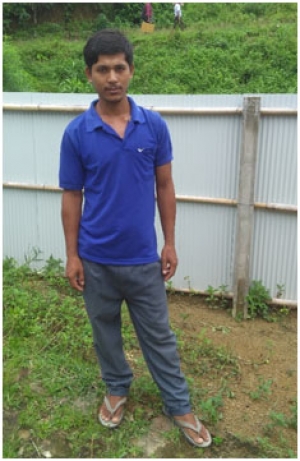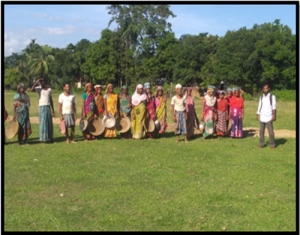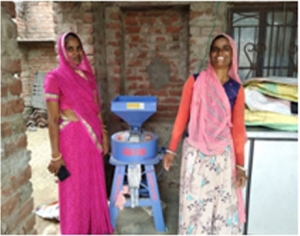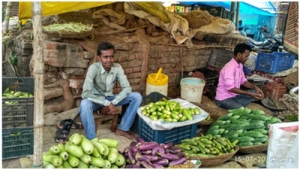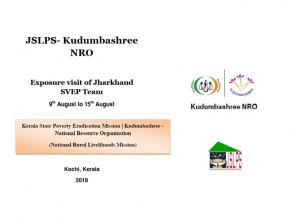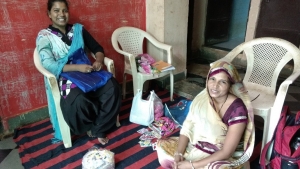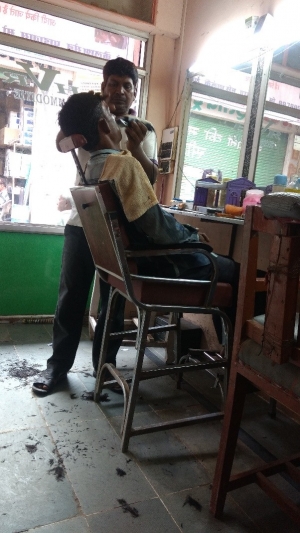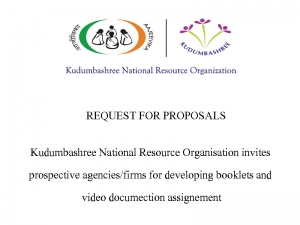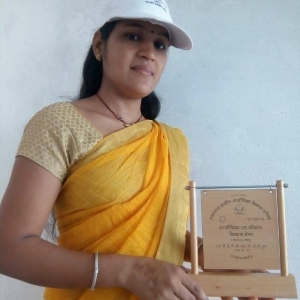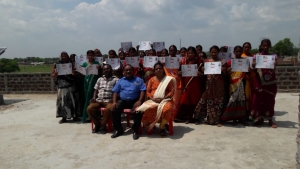Kudumbashree NRO
An unconventional story from the difficult terrains of Tripura
Naveen Molsom has played an integral role in ensuring the smooth functioning of the Self-help groups in Uttar Baramura. Uttar Baramura, a Gram Panchayat located at a distance of 10 km from Killa Block, is one of the places that has Molsom community in majority and significant pockets of Khalai community as well. Geographically, it is located in a difficult terrain where villages are on top of steep hills and are far apart from each other. TRLM (Tripura Rural Livelihood Mission) in the initial phase found it extremely difficult to work in such places where not only the geographical conditions are difficult, but the language was also different from rest of the areas in which they were working. The Molsom community speaks molsom whereas the officials or the cluster co-ordinators speak Khokborok, the native language of several tribal groups in Tripura. However, the SHG women understood very little Khokborok and found it difficult to converse in the same language. To develop the community cadres from within the SHG women was one of the most important aim the TRLM had set for itself. However, in places like Uttar Baramura, it was difficult to find women who were literate enough to become book keepers and community service providers. Here is where Naveen came to picture.
When TRLM started forming self-help groups here, Naveen encouraged his wife to join one of the groups as he had seen such groups function in Ompi Block of South Tripura District. He had accompanied his wife for one of the meetings and witnessed how the women were struggling to maintain the necessary books of records. He then helped the group and one another in maintaining their books. This happened for quite some time. He later on received trainings just like any other book keeper. However, he was not eligible for payment as a cadre of TRLM since he was not an SHG member. “I did not have any issue with the payment part because I really want women to come together as a group and continue their thrift and credit activities as I found it really essential. Even if I was not paid, I felt good whenever the SHG members tried to involve me in discussions and take my opinion into consideration. For me this is what really matters”, says Naveen.
He was actively involved in all SHG related tasks and that is when he happened to attend the Village Organisation (V.O) meeting where the V.O members were to be oriented about the PRI-CBO project. The Mentors from Kudumbashree NRO found it extremely difficult to convey the essence of the project to the community and that is when Naveen offered to be a translator for them. As he is not an LRG he can’t be an official cadre. But, he along with three other LRG members have been actively working in Uttar Baramura under the PRI-CBO project.
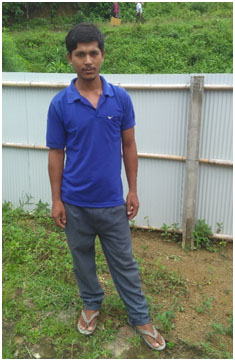
Naveen Molsom
He helped in conducting the participatory planning exercises within the SHGs. Since then, he has been an active member especially with respect to the mobilisation of women. TRLM has now changed its policy of developing cadre only from among the SHG women. He is soon set out to become a Master book keeper.
“I will keep helping Mentors with the project as it is extremely important for the women to be aware about their entitlements.
I will do whatever possible to the best of my ability”, says Naveen.
Information Dissemination leads to Active participation- A story from Assam
This story is about how awareness about the flagship programme MGNREGA created a ripple effect in the minority communities of Assam. It proves the innate capacity of women collectives to break the chains of restrictions and exploitation they were facing till time, all they wanted to ignite the inner fire was a piece of information and a resultant push from the women collectives towards bringing a change.
It is in June 2017, the convergence project started to operate in Borsola block. Dhalaguri is one of the Gram Panchayats in Borsola block, where the PRI-CBO Convergence project is being implemented. The Panchayat has a mixed population of various tribes and minority communities. Usually the minority community remained hesitant to mingle with others and were always confined to themselves. As part of the project activities the LRG members were oriented about various centrally and state sponsored schemes and the benefits. Since Mahatma Gandhi National Rural Employment Guarantee Scheme (hereafter MGNREGS) being a demand driven scheme, LRG members realized their scope in working with it. They noticed that there was a stark difference in the women participation under MGNREGS. This was because women were not willing to apply to under MGNREGS since it was always considered to be something meant only for men. This made the women from minority community reluctant towards MGNREGS. In addition to it, the scheme was not properly implemented in their GP due to discrepancies in fund flow and utilization. To bring a change in this picture, the LRG members mobilized the SHG network and sensitized about the unexplored opportunity they have with them in working under MGNREGS. One of the LRG member, Saheli who hails from minority community took the initiative of sensitizing her community and motivated the women to work under MGNREGS. Slowly, the SHG network realized that MGNREGS protects their right to be employed and hence it doesn’t exert any barriers to be employed, be it gender, caste or age.
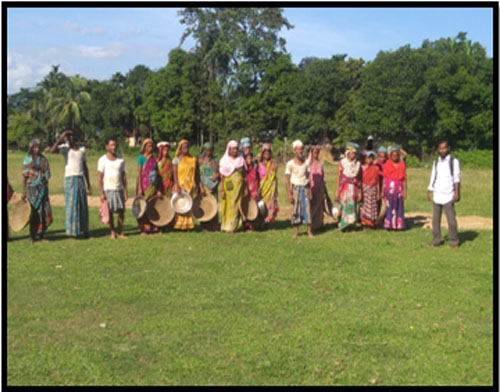 Women from Dhalaguri Gram Panchayat participating in MGNREGA work
Women from Dhalaguri Gram Panchayat participating in MGNREGA work
For majority of the people at Dhalaguri GP, the job card was a mere document they were keeping for the past two years. It was the same with minority community too. They were demanding for land levelling of their iddgah* field from 2016 and the same was approved in Gram Sabha too. But the work was never initiated till 2018. As part of the MGNREGS mobilization, it was on 15th August Gram Sabha, the villagers submitted their work demand under MGNREGS for land levelling of their iddgah field. This time woman from SHG network also demanded for work, inculcating the sprit and perseverance shown by their LRG member Sahela. But, the Gaon Sevak kept on postponing the dates. Sahela and the members of SHG federation approached the secretary of the Gram Panchayat and demanded that the work should be given to women. As a result of the constant effort put by the women collectives from the SHG federations, the work for the Iddgah field got approved. Making a history in Dhalaguri GP, twenty-three minority women from minority community came forward to work under MGNREGS for the first time. They were given ten days of work. The Block Development Officer (hereafter BDO) inspected the work site and was impressed to see the change which the women collectives could bring in that village. The Gram Panchayat developed a trust towards the SHG federation and LRG in their efforts and they were given the task of monitoring the quality of the work.
![]()
On the other hand, the Gram Panchayat Secretary said “It is quite surprising to see minority women
coming for MGNREGS work in Dhalaguri GP. I have been working here for the past four years and
the LRGs have been working extremely hard to bring out women who were only part of household
work. Now they are also part of MGNREGS work for their livelihood this shouldn’t stop here and
should continue in the days ahead.
Also the LRG Sahela said “Initially it was quite difficult for me to motivate the women to come for
MGNREGS work. But Gram Sabha has been a platform which has bought women together and
discussions on various schemes have been happening. Today I have shown path to these women
and it gives me immense happiness that I have been able to change their lives in a small way”
Sahela said with tears rolling out from her eyes with happiness”.
*Idgah
It is a term used in South Asian Islamic culture for the open-air enclosure usually outside the city (or at the outskirts) reserved for Eid Salah, Islamic prayer offered in the morning of Eid al-Fitr and Eid al-Adha.
Vimladevi Nath-A Village Entrepreneurship Success Story
Vimladevi Nath was a struggling widow who used to work as a construction labourer in Bharai Gram Panchayat of Kekri Block in Ajmer district (Rajasthan). She has three children, two sons and a daughter. Her husband was a chronic alcoholic who succumbed to his habit eight years ago. Since then the bare minimum wages she earned had sustained the family. When Chandrasakhi, the Micro Enterprise Consultant oriented her SHG, Vimladevi expressed her interest to start a flour mill in her village. She chose a flour mill over other options she had because she belonged to the Gurjar community which had a considerable presence in the village. However, not a single household of the community had a flour mill and the others who owned non-commercial mills were reluctant to let Gurjars use them due to the caste issues prevalent in the village. The community faced difficulty in carrying the grains to the town and the flour back home due to the poor condition of the road connecting the village and due to the absence of public transport.
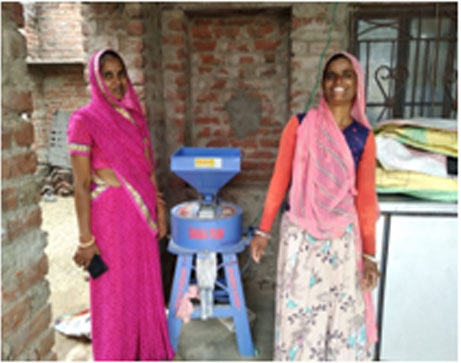
Left to Right: Chandrasakhi, Vimladevi
She established a flour mill in her house with the help of a loan taken from the Block Resource Centre. Her enterprise became a hit soon as she had at least 100-150 households in the village who wanted to avail her service and from them she was able to charge a higher fee than the market price. However, Vimladevi, a determined woman still utilises her free time during day to work as a daily wage labourer and hence maximises her monthly revenue. If there are customers coming during day time, Vimla’s sister would do the chores. Vimla usually returns to her shop for the peak hours by 3 PM every day. She says, “My life has been a story of constant struggle. Right from my childhood, and my marriage was disastrous. When I was convinced that there was no hope left, I was at the verge of taking my elder son with me to the construction site. I never wanted that to happen. I wanted to give them education. Chandrasakhi di came then and saved my children’s future…”
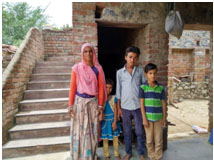
Vimladevi and her children
Today she earns a decent living from the mill in addition to the wages. Chandrasakhi opines that the revenue has been decreasing due to the seasonal nature of agricultural produce. To combat this, she seeks to expand the customer base for Vimladevi. For this, Chandrasakhi has been accompanying Vimladevi to SHGs of nearby villages to market her enterprise.
Story of Upendra Kumar-A passionate entrepreneur and president of CRP-EP group under SVEP
Upendra Kumar, a passionate youngster from Satbarwa block of Palamu district of Jharkhand, completed his Bachelors Degree in Arts and joined as a Micro-Enterprise Consultant (MEC). It was his first job and he enjoyed the challenges associated with it. After getting trained from Kudumbashree NRO, his level of confidence and interest towards the project increased. He was able to support a large number of entrepreneurs and was a driving force in implementing the project in the block.
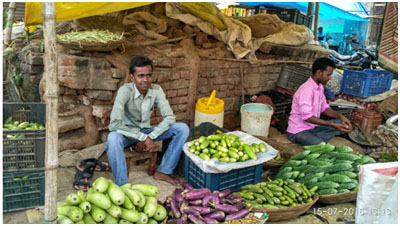
When Upendra was trying to establish himself as a MEC in his village, he came to know that the project will soon come to an end in the State. In order to inspire others for setting up business, he himself started a small vegetable shop. As the SVEP project began in the state, he was selected again as the CRP-EP for supporting entrepreneurs under the project. Looking at his experience and expertise, he was made the president of the CRP-EP group of the Block. He is now looking forward to strengthening his skills as a consultant and aims to encourage more people to start their own enterprise.
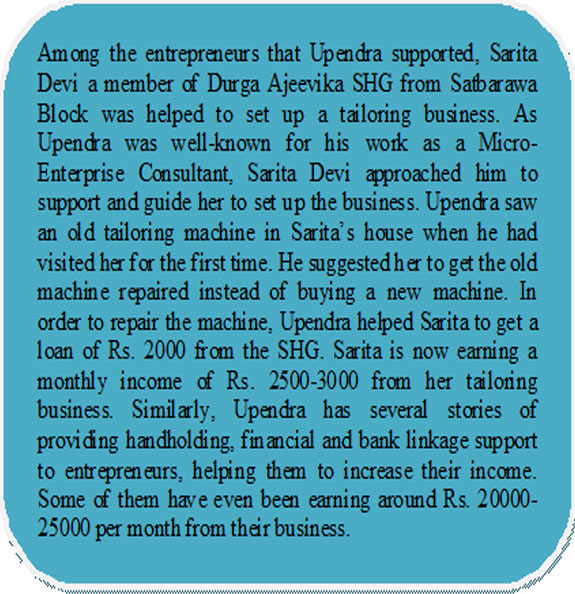
Report of Jharkhand team exposure visit
The CRP-EP whose strategy increased profit and provided employment
Nathdwara,48 kms away from Udaipur, is famous for its Lord Krishna temple. Thousands of pilgrims visit the temple ever year. Mohini Devi, a resident of Gangapur village in Begun block of Chittorgarh, Rajasthan, makes garlands and other decorative items used as offerings by pilgrims visitng the temple. She supplies these items to the Nathdwara market.
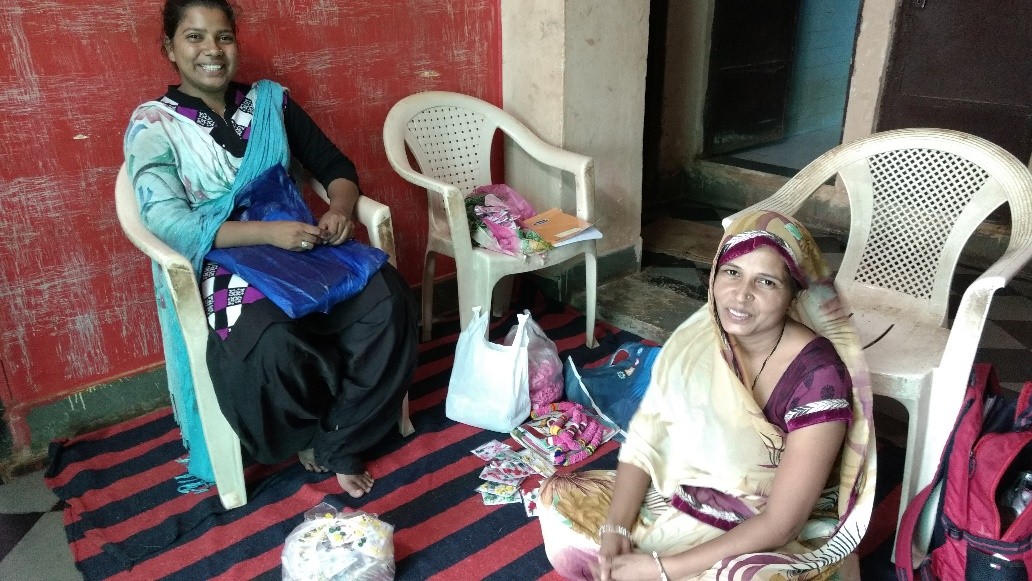
Mohini with CRP-EP Ratna
Mohini had lost her husband four years ago and lived with her three kids. After the death of her husband it became really difficult for her to make ends meet. It was then that her sister in law, living in Nathdwara, introduced her to garland making. Mohini got a livelihood opportunity but the work demanded a lot of her time. She was unable to get enough income even after working for hours. The money was not sufficient to meet the household needs and the expenses of her three kids. Mohini’s dying business required some serious change in strategy.

Garlands made by Mohini
It is at this point that she came to learn about the SVEP project in one of SHG meetings. Ratna, the CRP-EP under SVEP project, helped Mohini to turn around her business. Not only did she help her get a loan of Rs.45000 but also provided her with some valuable guidance. Mohini was worried that hiring other women might create competitors. Ratna knew that more competitors in a limited market size will erode the margins for Mohini. She addressed the problem in a practical manner and advised Mohini to get different parts prepared from the helpers and do the final assembling and packaging herself. This helped Mohini Devi in meeting the excess demand without creating competitors at local level. The strategy not only increased the revenue by 75% but also helped four other women in getting employment. Today, Mohini is able to earn Rs.20000 per month. And during peak seasons she even gets Rs.30000 in a month.
SVEP project has helped a lot of women, like Mohini, not only in addressing the financial need of their business but also trained community professionals in providing handholding support and devising strategies that are helpful in increasing the entrepreneur's income substantially.
From Rs. 2000 to Rs. 20,000- The making of an entrepreneur
Kailash Sen, a resident of Meghpura Panchayat of Begun Block in Chittorgarh, Rajasthan worked as a helper in a men’s parlour in Begun market where he earned a meagre amount of Rs.1000-1500 per month. It was getting difficult for him to feed his five member family. As his wife was an SHG member, she used to take loans for all the family needs like meeting household expenses, education of the children and even marriage of their two daughters. Loans became a normal way of meeting the household expenses. But loans had to be repaid and he knew that this could never be a permanent solution to his problems.
After getting support from Micro Enterprise Consultant under SVEP, Kailash started his own men’s parlour in Begun with a loan of Rs.40000. At his shop, sensing the changing environment and growing inclination of men toward styling, Micro Enterprise Consultant suggested Kailash to diversify the portfolio of services provided by him. Kailash started offering massage and bleaching services in the parlour apart from shaving and hair-cuts. Soon, the business started to grow and number of customers started increasing day by day. The demand reached to a level that Kailash had to hire two helpers to assist him. The profits also started increasing and Kailash, who once could barely earn Rs.2000 in a month was now able to make Rs.20000 per month from his parlour. Today, Kailash is so happy with the profits he is earning that he is looking forward to get a Beauty Parlour opened for his daughter in law. He mentions that the small instalments and low interest rate offered under SVEP have reduced a lot of burden of repayment.
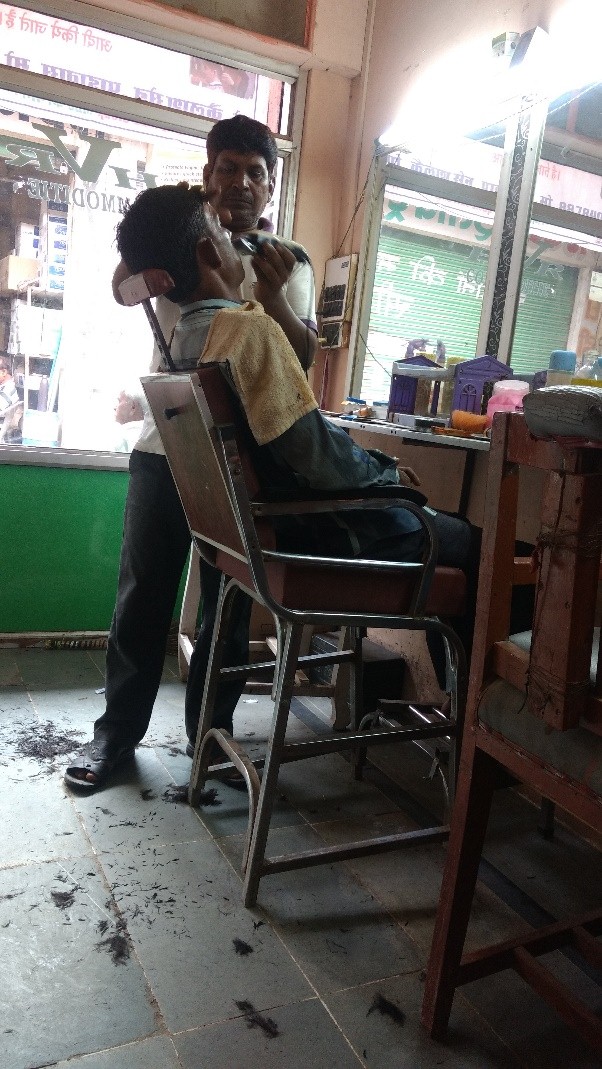
Kailash at his parlour
Kudumbashree NRO invites proposals for documentation project
Request for Proposal (RFP) for Developing Booklets and Video Documentation on MEC project in Rajasthan
Kudumbashree National Resource Organization (KS-NRO) is calling for proposals from prospective agencies/firms for Developing Booklets and Video Documentation on the Micro Enterprise Consultant (MEC) project in Rajasthan. Kudumbashree NRO has been running projects in the area of PRI-CBO Convergence and Enterprise Development in more than eighteen states across the country. The project which is being implemented in Rajasthan, deals with providing livelihood opportunities for the community. As the MEC Project is at a concluding phase, the objective of the assignment is to document the impact of the project through short videos and published materials. For more information on the project and the work conducted by KS-NRO, please refer to the website www.keralanro.org.
Based on your expertise and experience we would like to invite prospective agencies/firms to submit technical and financial proposal in the prescribed format to carry out the assignment. RFP document and Annexures have been attached.
Proposals in the prescribed format should be sent by post so as to reach the office of KS-NRO latest by 5 p.m. on 10th August 2018.
Proposals should be addressed to
The Executive Director
Kudumbashree-National Resource Organization
IIIrd Floor, Carmel Towers, Cotton Hill,
Vazhuthacaud PO, Thiruvananthapuram
695014
Nurturing Role Models through entrepreneurship – A story from Rajasthan
In comparison to men, women entrepreneurs from rural areas tend to face more constraints while participating in the process of local economic development. Factors like traditional gender roles, mobility issues, access to financial services, limited managerial skills and low self-esteem can hinder their progress in realising their potential as an entrepreneur. It calls for a need to focus on rural women for engaging them in the larger context of rural development by providing a conducive space for taking up entrepreneurial opportunities. The Start-up Village Entrepreneurship Program (SVEP) works with the community network of women formed under NRLM and focuses on expanding the livelihood portfolio of the rural poor. The special assistance of the program in the form of technical and financial support structure helps entrepreneurs in developing and sustaining their own ventures. Kudumbashree NRO which is implementing the program in nine states, has been actively trying to engage women in the process of entrepreneurial restructuring in these communities. With more than 90% women CRP-EPs (community cadre for promoting entrepreneurship in the village) engaged in SVEP partner states, a conscious attempt is being made to bring women in the forefront of the entrepreneurial space. Anjana Sen from Kekri Block of Ajmer district, is one such woman selected to work as CRP-EP under SVEP who has also started her own ventures to become financially independent and support her family.
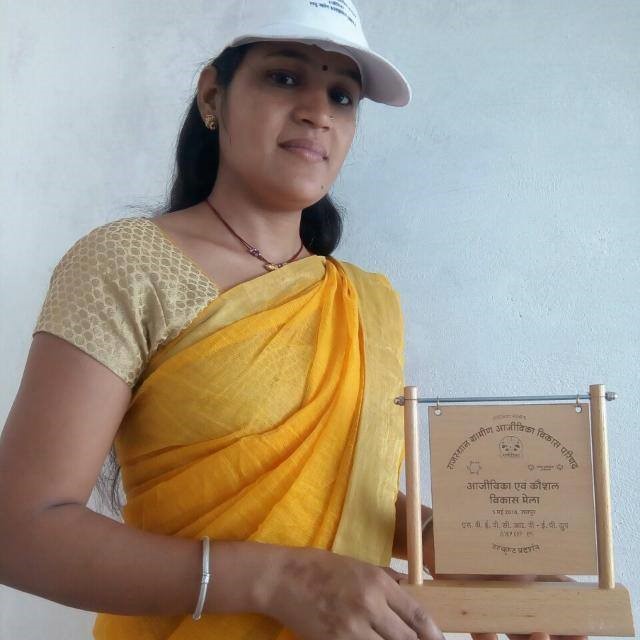
Anjana Sen, CRP-EP from Kekri Block
Around seven years back Anjana’s parents married her off in a small village of Ajmer district hoping to give a better fortune for their daughter. Little did they know that her husband’s small saree shop would be shut by the local authorities in favour of a local construction project. It was a big blow to the family but it also brought the best out from Anjana. Sharing her journey, she informed that it was important for her to explore more options and hence started actively participating in SHGs and Gram Sangathans (VOs).
In one of the VO meetings, she met KS-NRO Mentor Jaya, who encouraged her to sit for the CRP-EP selection. Despite having a small baby and going against mother-in-law’s wishes, she got selected as a CRP-EP and attended the training programs. The training pushed her to put her learnings into practice by starting a women’s fancy store herself, which is still running. It helped her understand business dynamics. She took the advantage of her newly gained knowledge in identifying market gaps and seasonality and launched a small parlour business during the marriage season. Tapping other market opportunities, she along with her husband have also been supplying puris to Pani-puri vendors. Today, she is one of the best performing CRP-EPs in the state and strongly believes that micro-enterprises are the best way to empower women and combat poverty. She has opened 85 Micro Enterprises in Kekri Block. Sharing her thoughts she says
“Mahilaon ke chote chote bache hote hain. Toh mahilaon ka chota dhanda hoga toh bachon ka aur apna paisa hoga.
Mahilayein bhi khush rahengi. Yeh mahilaon ke liye sabse acha avsar hai” (Women have small children. So if women start small enterprises they will be able to take care of their children as well.
This is the best opportunity for women)
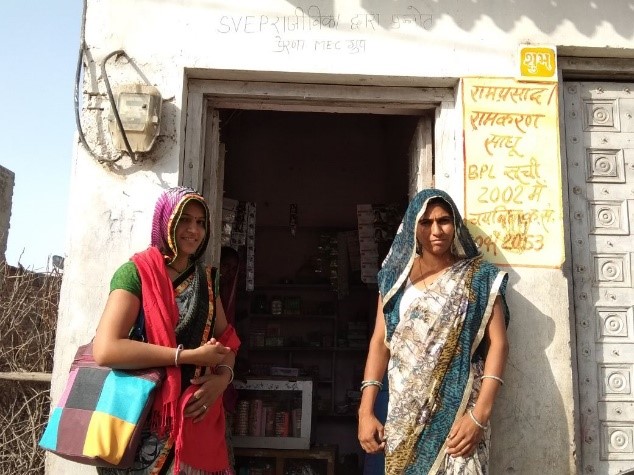
Anjana with an entrepreneur
Undoubtedly this explains why most of her clients are women. She laughingly shared that her first few clients were her friends and she intentionally started targeting them. This gave her confidence and helped build trust through the word of mouth. It is not an easy task to convince the poor to start an enterprise. When asked about how she does that, she says
“Business plan banati hoon, dikhati hoon aur ache se samjhati hoon. Batati hoon ki mene bhi toh dukan daali hai. Ek baar daal ke toh dekho.
Jab paisa dikhta hai toh log maante hain”. (I make business plans, show it to people and make them understand. I tell them that even I have started an
enterprise and encourage them to try at least once. When people see returns then only they get convinced.)
Most of her clients have a story to which Anjana strongly connects and that is her strength. Her work starts not by talking about micro enterprises but rather analyzing and understanding the realities of her fellow SHG women. She narrated the story of an entrepreneur who had a differently abled child. Because of her situation she could neither go to the fields nor could engage in any other work. Taking into consideration her constraints, Anjana developed a business plan for her and today that woman is earning Rs. 3000-4000 per month. More than a strategy, it is a well-established fact that women mobilize women the best as they connect to each other’s realities.
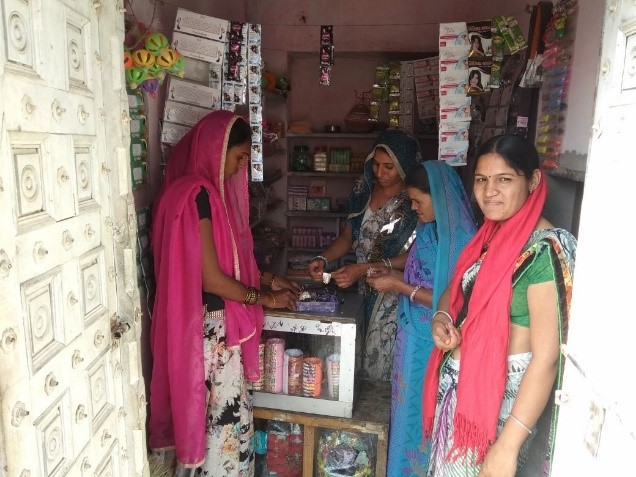
Anjana at an enterprise supported by her
Her husband has always been a big support and today she is the prime bread earner in the family. The role of CRP-EP has helped her build an identity for herself both within and outside the family. Unlike before, the mother of two now gets all the support she needs from her mother-in-law as well. Anjana shares about the autonomy that comes with financial independence. She concludes
‘Ghar mein kuch bhi samaan laon, kisi se poochna nahin padta. 100 rupay zyaada kyun de diye ya 20 kam kyun nahin kiye,
ab nahin sunna padta’. (I don’t have to ask anyone to buy anything for the house. I don’t have to give any explanation to anyone)
Skill training program organised for entrepreneurs in Bodhgaya
The SVEP team of Bodhgaya Block in Bihar had organised a skill training program for entrepreneurs in association with Rural Self Employment Training (RSETI). The team selected 31 women for the training from different villages after conducting initial set of orientation activities like GOT, EDP and other SHG triggering activities. The selected candidates had gone through 10 days residential training in the BRC of Bodhgaya Block. RSETI provided necessary financial and technical support required for the training.
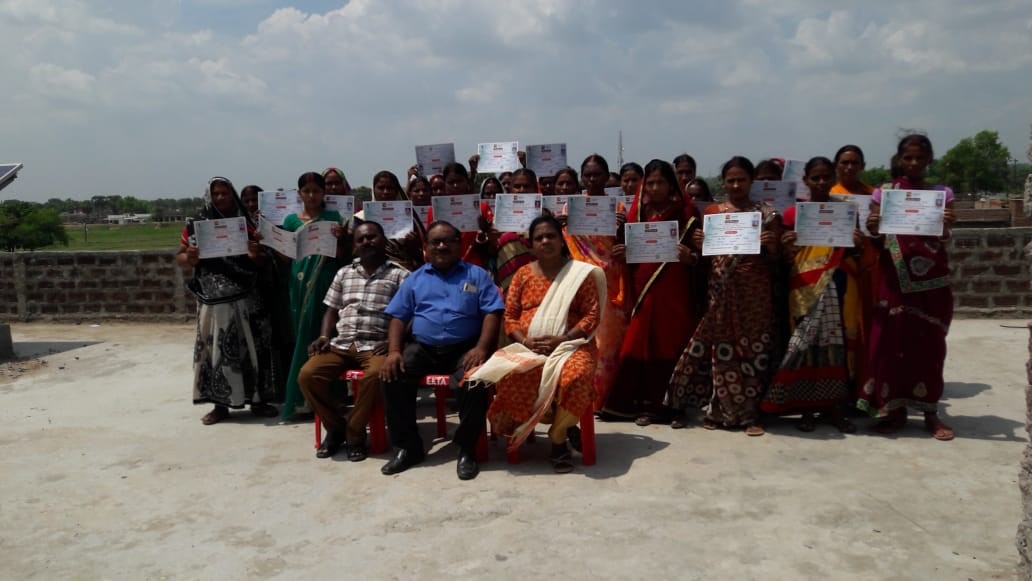
Entrepreners with their certificates
The focus of the ten day training was to impart skills on activities based on which enterprises can be set up. It would help the women entrepreneurs in launching ventures that have scope and are in demand by the locals. Training was given for making different products like candles, papad, spices, pickles, juice, soft toys, bakery products and embroidery & fabric painting. The technical aspects were covered by the expert faculty practitioner from RSETI and other areas like motivational, managerial, financial planning (financial literacy) aspects were imparted by the Director of RSETI. Mithilesh Kumar and Jyoti Kumari, CRP-EPs who have supported more than 100 enterprises in the block, took this initiative under the leadership of mentor Vijayarani.
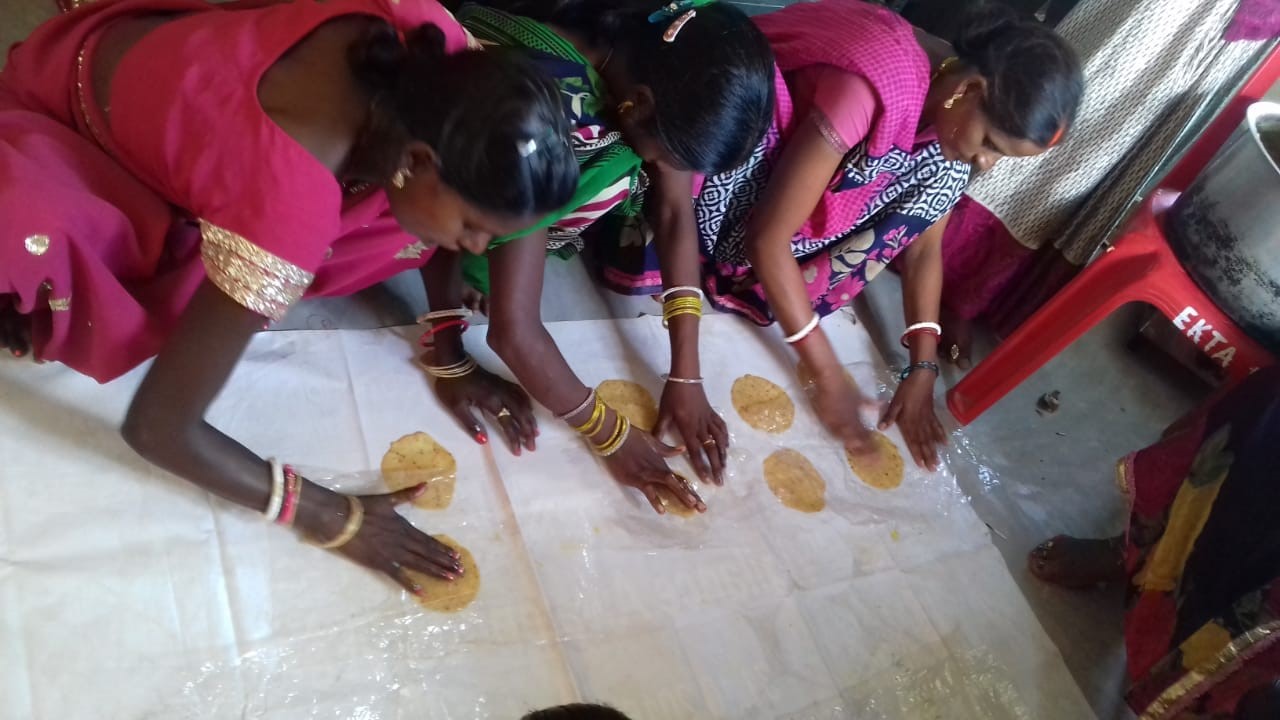
Women making Papad
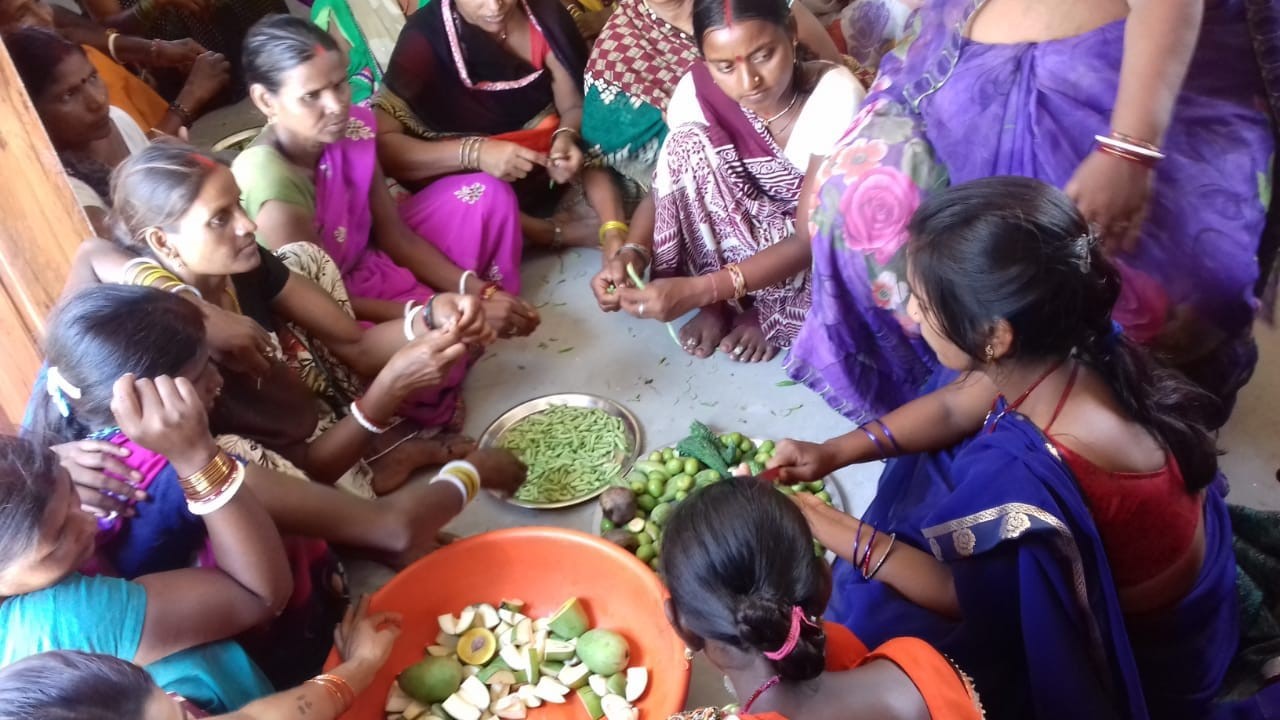
Women preparing mango pickle
Future course of action would be
• The entrepreneur will take up specific entrepreneurial activity to start an enterprise with the financial and handholding support under SVEP.
• Regular refresher training on soft skills, technology, innovation, financial literacy, value addition of the product would be provided by RSETI.
• In addition RSETI has agreed to conduct training programs in areas like electric motor rewinding & pump set maintenance, beauty parlor management, basic photography & videography, phone servicing, domestic electrical appliance repair, two wheeler servicing, computer DTP, refrigeration & air conditioning, computer tally and computer basics.
